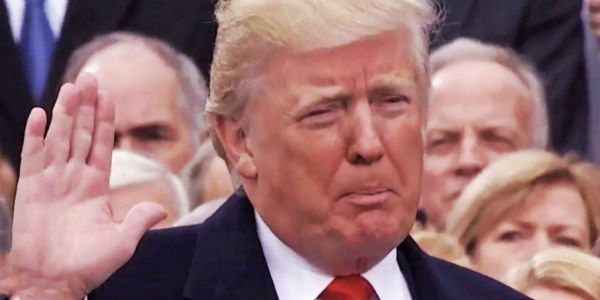Eleven ways Trump has violated democratic norms in his first month in power
Donald Trump was inaugurated on 20 January. In the past month, writes Brian Klaas, the President has already begun to erode democratic norms – and if we accept these violations as ‘the new normal’, American democracy is at risk. He sets out eleven ways in which Trump has undermined democratic institutions.

Donald Trump is inaugurated on 20 January. Photo: Karl-Ludwig Poggemann via a CC-BY 2.0 licence
Democratic norms die slow deaths when citizens accept them as the new normal; it’s important to catalogue their erosion in the past month.
1. The President called serious, legitimate journalists and their publications “enemies of the American people,” language used by dictators.
2. Trump attacked the independent judiciary as “so-called judges” for doing their jobs and insinuated he would blame them for a terror attack.
3. Trump cast bogus aspersions on the democratic process itself by lying about voter fraud in spite of clear evidence debunking his claims.
4. He repeatedly threatened to undermine public confidence in a pillar of democracy by calling serious, well-sourced reporting “fake news.”
5. His senior counsellor, Kellyanne Conway, clearly violated ethics rules, using the office of the president for private family gain without consequences.
6. Trump’s National Security Advisor Michael Flynn resigned but ONLY after the story about Flynn’s lies about private diplomacy with Russia became public.
7. Trump eagerly violated the emoluments clause, not only in taking foreign payments but also the post-election Chinese trademark approval.
8. Trump (again) lied about the US murder rate as a way to stoke fear and yet did not apologise for it or correct himself – not once.
9. Trump’s surrogates fabricated terror attacks in Bowling Green and Atlanta, and he made one up in Sweden. No public apology from Trump.
10. Trump’s private club is selling access to the President and profiting off it – doubling the member fee for Mar-a-Lago recently to $200k.
11. The President of the United States claimed that negative polls were “fake news” but that positive polls were real; 1984esque doublespeak.
This is just one month. If we accept these violations of basic norms, our democracy will die a death of a thousand cuts. We must speak out.
This post represents the views of the author and not those of Democratic Audit. It is adapted from a series of tweets by Brian Klaas.
 Brian Klaas is LSE Fellow in Comparative Politics. Read an extract from his new book about democracy in decline, The Despot’s Accomplice.
Brian Klaas is LSE Fellow in Comparative Politics. Read an extract from his new book about democracy in decline, The Despot’s Accomplice.
Also by Brian Klaas:





 Democratic Audit's core funding is provided by the Joseph Rowntree Charitable Trust. Additional funding is provided by the London School of Economics.
Democratic Audit's core funding is provided by the Joseph Rowntree Charitable Trust. Additional funding is provided by the London School of Economics.
The problem with this is that you could write the same about almost every government to some degree…and to refer to ‘norms’ as if what has passed for a ‘norm” in democracy in recent years equals a plus invites derision.
To describe much of the spectacularly false and slanted reporting as “serious well-sourced reporting” is surely the writer’s little joke. Most of the ‘sources’ are not even quoted. They are just that – the usual lazy campaigning smears stating “a well placed source claimed that…” followed by a pack of sheer invention. A well placed source? Who? Name them. Otherwise “fake news”. All the smears about the president’s wife saying “for a fact, according to sources” that she was “unhappy”. Never one source quoted, only the careful selecting of a moment-in-time bit of film, a pose of a few seconds that anyone of us could be caught in (did anyone ask her? Nope).
The hidden filming of organisations like CNN coaching their own staff to pretend that they are members of the public to stand in front of the cameras and get ’emotional’ over Trump (‘squish squish sweetie, are those tears convincing enough luv?’)…the antics of broadcast media acting as cheerleaders of Clinton passing her in secret a steer on the debate beforehand…credible? I think not. Serious and well sourced?
Once the media becomes part of the elite baying for the blood of any opponent like Trump, then it is part of the problem, however much it affects a faux and cringemaking detachment.